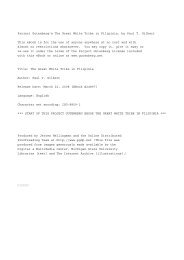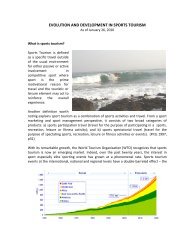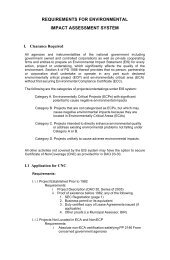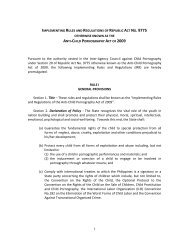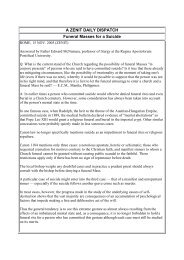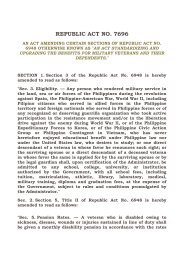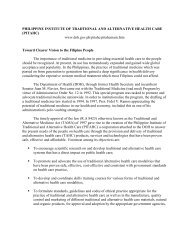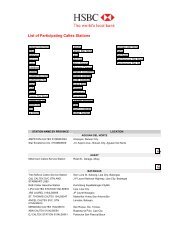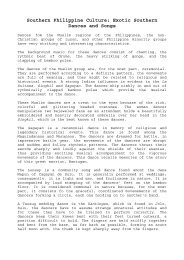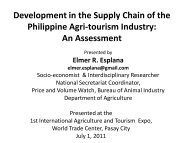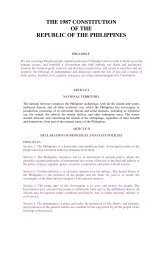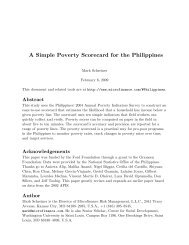Mining in the Philippines - Concerns and Conflicts
Mining in the Philippines - Concerns and Conflicts
Mining in the Philippines - Concerns and Conflicts
You also want an ePaper? Increase the reach of your titles
YUMPU automatically turns print PDFs into web optimized ePapers that Google loves.
Foreword<br />
Hav<strong>in</strong>g visited many develop<strong>in</strong>g countries <strong>and</strong> seen many places where environmental degradation<br />
or destructive development has damaged <strong>the</strong> livelihoods of people, I was never<strong>the</strong>less deeply<br />
shocked by <strong>the</strong> negative impact of m<strong>in</strong><strong>in</strong>g <strong>in</strong> <strong>the</strong> Philipp<strong>in</strong>es. In July 2006 I led a team of human<br />
rights <strong>and</strong> environmental experts on a fact f<strong>in</strong>d<strong>in</strong>g visit to <strong>the</strong> Philipp<strong>in</strong>es <strong>in</strong> order to exam<strong>in</strong>e <strong>the</strong><br />
impact of m<strong>in</strong><strong>in</strong>g on <strong>the</strong> environment <strong>and</strong> people’s livelihoods. We met with communities affected<br />
by m<strong>in</strong><strong>in</strong>g <strong>and</strong> proposals for new m<strong>in</strong>es. We heard how <strong>in</strong>digenous people had been shifted off <strong>the</strong>ir<br />
l<strong>and</strong>s to make way for m<strong>in</strong><strong>in</strong>g <strong>and</strong> how <strong>the</strong>ir consultation rights had been underm<strong>in</strong>ed <strong>and</strong> ignored.<br />
We saw polluted rivers, destroyed mangrove forests, damaged coral <strong>and</strong> ru<strong>in</strong>ed agriculture. We<br />
concluded that <strong>the</strong> Philipp<strong>in</strong>es is <strong>in</strong> danger of los<strong>in</strong>g much of its rich biodiversity <strong>and</strong> damag<strong>in</strong>g <strong>the</strong><br />
lives of unique <strong>in</strong>digenous cultures. I believe that current plans for m<strong>in</strong><strong>in</strong>g <strong>in</strong> <strong>the</strong> Philipp<strong>in</strong>es should<br />
be scrapped <strong>and</strong> a new strategy put <strong>in</strong> place which takes proper account of <strong>the</strong> large number of jobs<br />
that already exist <strong>in</strong> small scale m<strong>in</strong><strong>in</strong>g <strong>and</strong> <strong>the</strong> need to establish criteria for that development of <strong>the</strong><br />
m<strong>in</strong><strong>in</strong>g <strong>in</strong>dustry which protects <strong>the</strong> precious <strong>and</strong> unique biodiversity of <strong>the</strong> Philipp<strong>in</strong>es <strong>and</strong> <strong>the</strong> rights<br />
of <strong>in</strong>digenous communities.<br />
Dur<strong>in</strong>g our visit, we found scant evidence of m<strong>in</strong><strong>in</strong>g benefit<strong>in</strong>g local people or <strong>the</strong> country’s<br />
economy. We believe that <strong>the</strong> Government of <strong>the</strong> Philipp<strong>in</strong>es <strong>and</strong> <strong>the</strong> m<strong>in</strong><strong>in</strong>g companies have failed<br />
to comply with national law <strong>and</strong> <strong>in</strong>ternational st<strong>and</strong>ards. We believe that <strong>the</strong> Government should be<br />
challenged to demonstrate that it is will<strong>in</strong>g to adhere to its own laws <strong>and</strong> <strong>in</strong>ternational m<strong>in</strong><strong>in</strong>g best<br />
practice by immediately refus<strong>in</strong>g all m<strong>in</strong><strong>in</strong>g applications which would damage critical watersheds,<br />
ecosystems, agriculture or fisheries or lead to serious social disruption. We are also concerned that<br />
some of <strong>the</strong> m<strong>in</strong><strong>in</strong>g companies are based <strong>in</strong> <strong>the</strong> UK <strong>and</strong> <strong>in</strong>creas<strong>in</strong>gly money raised <strong>in</strong> <strong>the</strong> City of<br />
London is be<strong>in</strong>g used to fund disastrous projects.<br />
World Bank support for an expansion of destructive m<strong>in</strong><strong>in</strong>g <strong>in</strong> <strong>the</strong> Philipp<strong>in</strong>es is also a matter of great<br />
concern <strong>and</strong> given <strong>the</strong> substantial provision of fund<strong>in</strong>g to <strong>the</strong> World Bank by UK taxpayers, a matter<br />
that should be taken up by parliamentarians <strong>and</strong> <strong>the</strong> Department for International Development.<br />
Similarly <strong>the</strong> European Union claims that its development programmes are dedicated to <strong>the</strong><br />
protection of <strong>the</strong> rights of <strong>in</strong>digenous people <strong>and</strong> to a strong commitment to susta<strong>in</strong>able development<br />
but its development <strong>in</strong>terventions <strong>in</strong> <strong>the</strong> Philipp<strong>in</strong>es are fail<strong>in</strong>g to live up to <strong>the</strong>se st<strong>and</strong>ards. All<br />
<strong>the</strong>se development agencies should play a bigger role <strong>in</strong> help<strong>in</strong>g <strong>the</strong> Philipp<strong>in</strong>es protect <strong>and</strong> restore<br />
its degraded environment <strong>and</strong> thus enhance <strong>and</strong> provide a susta<strong>in</strong>able future for millions of poor<br />
people work<strong>in</strong>g <strong>in</strong> agriculture <strong>and</strong> fisheries. We also believe that <strong>the</strong> <strong>in</strong>vestor community must<br />
behave more responsibly <strong>in</strong> <strong>the</strong>ir <strong>in</strong>vestment decisions <strong>in</strong> <strong>the</strong> Philipp<strong>in</strong>es.<br />
My own conclusion from <strong>the</strong> visit was that I have never seen anyth<strong>in</strong>g so systematically destructive<br />
as <strong>the</strong> m<strong>in</strong><strong>in</strong>g programme <strong>in</strong> <strong>the</strong> Philipp<strong>in</strong>es. The environmental effects are catastrophic as are <strong>the</strong><br />
effects on people’s livelihoods.<br />
The attached report has been prepared by Cathal Doyle, Irish Centre for Human Rights, National<br />
University of Irel<strong>and</strong>, Galway, Clive Wicks a UK Member of CEESP <strong>the</strong> IUCN Commission on<br />
Environmental Economic <strong>and</strong> Social Policy <strong>and</strong> Fr Frank Nally, UK Columban Faith <strong>and</strong> Justice<br />
Office <strong>and</strong> takes fur<strong>the</strong>r <strong>the</strong> conclusions that I have outl<strong>in</strong>ed here. We all wish to express our<br />
solidarity with <strong>and</strong> admiration for <strong>the</strong> Catholic Bishops’ Conference of <strong>the</strong> Philipp<strong>in</strong>es which has<br />
been vocal <strong>in</strong> its public opposition to <strong>the</strong> country’s 1995 <strong>M<strong>in</strong><strong>in</strong>g</strong> Act, local m<strong>in</strong><strong>in</strong>g practices <strong>and</strong> plans<br />
for a massive expansion of m<strong>in</strong><strong>in</strong>g.<br />
Clare Short MP<br />
House of Commons<br />
13 December 2006<br />
i



